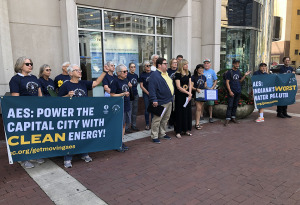Plunging natural gas prices help relieve inflation pressure
Since the start of 2023, U.S. natural gas prices have fallen 40%, and Europe’s prices are not far behind.
Since the start of 2023, U.S. natural gas prices have fallen 40%, and Europe’s prices are not far behind.

Indiana House lawmakers advanced a bill Monday that could encourage more natural gas in the state and allow utilities to charge ratepayers for a plant before it ever goes online.

A measure allowing utility companies to ask courts to appoint receivers over certain landlords behind on their utility bills passed unanimously out of an Indiana Senate committee Thursday.

Indianapolis-based utility AES Indiana has agreed to reduce the amount it will charge customers for costs related to the breakdown of its newest power plant from $71 million to $13.7 million under a settlement agreement approved Wednesday by state regulators.

The multiyear project will include installation of two new 69-kilovolt electric transmission lines to serve fast-growing Noblesville and Westfield.
Central Indiana awoke Friday morning to less snow than feared, but subzero temperatures and strong wind gusts still closed many area holiday attractions and created slick but passable roads.
Intera Inc., an Austin, Texas-based water resources planning company, is leading the study into future water availability in the county.

An Indianapolis-based ratepayer protection group has asked federal regulators to audit spending by a Carmel-based energy transmission system operator for an annual meeting at luxury resort 600 miles beyond its service territory.

The utility is asking for permission to pass on the cost of power it had to purchase from the grid during the outage, but customers are objecting.
Merrillville, Indiana-based Northern Indiana Public Service Co. asked the Indiana Utility Regulatory Commission this week to approve the rate increase over two years for its 470,000 customers across 32 northern Indiana counties.
David Veleta succeeds David Ober, who resigned as commissioner in June after being named vice president of taxation and public finance for the Indiana Chamber of Commerce.
Citizens Energy Group on Thursday announced an agreement with landlord JPC Affordable Housing that will result in the sale of four properties and relieve most of JPC’s past-due utility-bill debt, now totaling more than $1.9 million.

The largest and dirtiest power plant in AES Indiana’s fleet is coming under renewed criticism for violating its air and water permits and for maintenance problems that have contributed to higher customer bills.

The Hoosier Environmental Council is now supporting the West Indianapolis Neighborhood Congress in its fight against the wastewater treatment facility the Ben Davis Conservancy District wants to build at 900 S. Tibbs Ave.

Duke Energy Indiana is planning to expand transmission lines, but residents are worried that some routes being considering would spoil the trail and tree-lined neighborhoods.
The Supreme Court ruling limiting the Environmental Protection Agency’s authority to regulate greenhouse gas emissions from power plants could have far-reaching consequences for the energy sector.
Citizens Energy Group announced Wednesday that it wants to acquire a small, little-known political subdivision in Marion County that was months away from starting construction of its own wastewater treatment plant to avoid Citizens’ rate hikes.
Hamilton County’s plan to install water and sewer utilities near U.S. 31 and East 236th Street will tap $25 million in funds Hamilton County received through the American Rescue Plan Act.

A fight over zoning has devolved into debates over odor, water quality, and the impact of another wastewater treatment plant in the area on nearby residents.

Called Thriving Buildings, the program’s initial phase includes voluntary participation by private building owners while mandating participation for some municipal buildings.